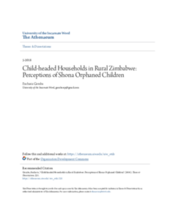Abstract
This qualitative ethnographic case study explored the phenomenon of Child- Headed Households (CHHs) in rural Zimbabwe from the perspectives of a Shona community. My intention was to gain an understanding on how these children access necessities like food, clothing, shelter, education, health care, and cope on a daily basis without parental care, or adult supervision. The perceptions of both the orphaned children and the adults in their community were investigated through the integrative lens of the Shona philosophy of unhu, Maslow’s hierarchy of needs, and Bronfenbrenner’s ideas of systems. The findings of this study show that children from childheaded households among the Shona people in Zimbabwe struggle to make ends meet without the traditional family structure and adult supervision, and that they experience social, educational, psychological, and social development problems. Although the orphaned children in this study showed resilience, bravery, and sense of responsibility as they cared for their siblings, they struggle to make ends meet as they fail to access basic needs. The systemic issues affecting Zimbabwe as a country enhance the plight of these children thereby making their stories vital and necessary to understand.

